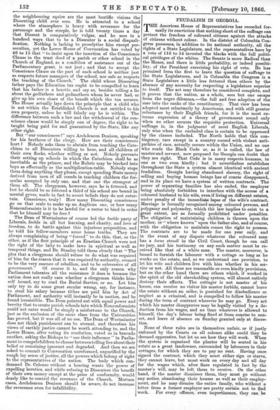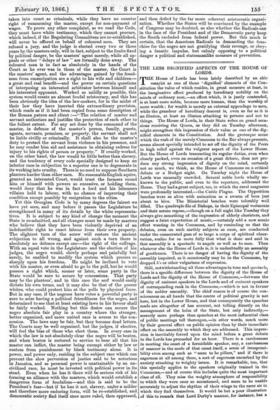FEUDALISM IN GEORGIA. T HE American House of Representatives has recorded
for- mally its conviction that nothing short of the suffrage can protect the freedom of coloured citizens against the attacks of citizens without colour. In the district of Columbia Con- gress possesses, in addition to its national authority, all the rights of a State Legislature, and the representatives have by a vote of 116 to 54 invested the blacks with the full politi- cal privileges of the whites. The Senate is more Radical than the House, and there is little probability, or indeed possibi- lity, of the President exercising his right of veto. He has promised from the first to leave the question of suffrage to the State Legislatures, and in Columbia the Congress is a State Legislature a little less fettered than others by the absence of any necessity for respecting a legislature superior to itself. The act may therefore be considered complete, and it proves that the nation, as a whole, sees but one escape from the negro dilemma,—the full and free adoption of the race into the ranks of the constituency. That view has been adopted most reluctantly by Americans, and with still greater reluctance by their English friends, for it is the most ex- treme expression of a theory of government sound only when no other secures the requisite protection. Universal suffrage is, in the judgment of most English Liberals, only wise when the excluded class is certain to be oppressed by the classes included. The North holds that this con- tingency, rare except in a country cursed with violent anti- pathies of race, actually occurs within the Union, and no one who reads the Black Code or, as it is called, the law of master and servant, now proposed for Georgia can doubt that they are right. That Code is in many respects humane, in one or two even kindly ; but it nevertheless establishes throughout the State a system almost identical with ancient feudalism. Georgia having abandoned slavery, the right of selling and buying human beings has of course disappeared, and in its place we have a system of written contracts. The power of separating families has also ended, the employer being absolutely forbidden to interfere with the access of a coloured husband to his wife, even if living on different estates, under penalty of the immediate lapse of the wife's contract. Marriage is formally recognized among coloured persons, and polygamy and polyandry, which the law implies to exist to a great extent, are as formally prohibited under penalties. The obligation of maintaining children is thrown upon the mother, or " where known" upon the father also, and of course, with the obligation to maintain comes the right to possess. The contracts are to be made for one year only, and in the event of any dispute whatever the coloured man has a locus standi in the Civil Court, though he can call no jury, and his testimony on any such matter must be re- ceived like that of a white man. The master, moreover, is bound to furnish the labourer with a cottage so long as he works on the estate, and, as we understand one provision, to let his wife and children live with him whether in his ser- vice or not. All these are reasonable or even kindly provisions, but on the other hand there are others which, if worked in the spirit of the old slaveholding system, will almost entirely destroy their effects. The cottager is not master of his house, can receive no visitor his master forbids, cannot leave the estate without an order, is punished for disobedience or neglect as a criminal, and is compelled to follow his master during the term of contract wherever he may go. Every act which his master disapproves may be legally visited by a de- duction from his wages, and no time whatever is allowed to himself, the day's labour being fixed at from sunrise to sun- set, and leave of absence on Sunday granted only at discre- tion.
None of these rules are in themselves unfair, or if justly enforced by the Courts on all colours alike could they be deemed oppressive, but let us see how they will work. When the system is organized the planter will be seated in his estate as a great landowner, surrounded by labourers in their cottages, for which they are to pay no rent. Having once signed the contract, which they must either sign or starve, they cannot leave, but must work on every day and all day for the wages which, after fines regulated in fact by the master's will, may be left them to receive. On the other hand, if the master dismisses them, they must go without any notice, abandoning their houses as well as their employ- ment, and he may dismiss the entire family, who without a letter from a former employer are pretty certain not to find work. For every offence, even impertinence, they can be taken into court as criminals, while they have no counter right of summoning the master, except for non-payment of wages. To prove any other complaint, as we read the Code, they must have white testimony, which they cannot procure, which indeed, if the Regulating Committees are re-established, will never be offered on behalf of coloured men. They are refused a jury, and the judge is elected every two or three years by the masters only, will in fact, subject to the limits fixed by political danger, be the masters' agent merely, while all ap- peals or other " delays of law " are formally done away. The coloured man is in fact as absolutely in the hands of the Court as he ever was in those of the master, the Court is the masters' agent, and the advantages gained by the freed- man from emancipation are a right to his wife and children— a great and real benefit—and the power on certain questions of interposing an interested arbitrator between himself and his interested opponent. Worked as mildly as possible, this system would create an almost feudal aristocracy, and this has been obviously the idea of the law-makers, for in the midst of their law they have inserted this extraordinary provision, which reads as if it had been copied from some description of the Roman patron and client :—" The relation of master and servant authorizes and justifies the protection of each other to the fullest extent. For any act done by the command of the master, in defence of the master's person, family, guests, agents, servants, premises, or property, the servant shall not be liable civilly or criminally. It shall also be the master's duty to protect the servant from violence in his presence, and he may render him aid and assistance in obtaining redress for injury to his rights of person or property." If cruelly worked, on the other hand, the law would be little better than slavery, and the tendency of every code specially designed to keep an inferior race in subjection to a superior one is to degenerate in its working into cruelty. There is no need to suppose Southern planters harder than other men. No reasonable English squire, granted an interested Court, would trust the farmers round him or himself with powers so excessive, or holding them, would deny that he was in fact a lord and his labourers villains held to labour, with no chance of improving their condition except possibly by emigration to the cities.
Yet this Georgian Code is by many degrees the fairest we have yet seen, and may before it passes the Legislature be strengthened in many of its details by the white representa- tives. It is subject to any kind of change the moment the State is re-admitted, and all changes must be made by masters who believe that they have been violently deprived of an indefeasible right to exact labour from their own property. The slightest turn of the screw will restore the ancient subjection to all wrong, and against such a turn there is absolutely no defence except one—the right of the suffrage. With an equal vote in the Legislature and the election of his judges, the negro would, slowly perhaps and painfully but surely, be enabled to modify the system which presses so sharply upon his freedom. He might be inclined to vote with his master, or even afraid to go to the poll, but he would possess a right which, sooner or later, some party in the State would be sure to secure by concessions. That party may be the planters', and in this case the serf would easily dictate his own terms, and it may also be that of the poorer whites, who could protect him at the polls by physical force. But in any case, if the negroes have votes a powerful party is sure to arise having a political friendliness for the negro, and determined to see that at least existing laws in his favour shall be fairly worked. Nothing but this desire can secure the negro absolute fair play in a country where the stronger, better organized, and more united race is averse to the con- cession. The laws may be fair, but they become dead letters. The Courts may be well organized, but the judges, if elective, will feel the bias of those who elect them. In every case in which the law is not absolutely clear the negro will be beaten, and when beaten is restored to service to bear all that his =aster can inflict, the master being exempt either by law or custom from punishment by black testimony alone. It is power, and power only, residing in the subject race which can prevent the slow perversion of justice said to be notorious in Jamaica, and as personal power is unattainable by an un- civilized race, he must be invested with political power in its stead. Even when he has it there will be serious risk of his forming an alliance with the masters, which would establish a dangerous form of feudalism—and this is said to be the President's fear—but if he has it not, slavery, under a milder and therefore more enduring form, will be re-established, and democratic society find itself Mice more ruled, then oppressed,
and then defied by the far more coherent aristocratic organi- zation. Whether the States will be convinced by the example of Congress may be doubted, as also whether the Radicals can in the face of the President and of the Democratic party keep the South excluded from federal power. But this much ifr certain, that the American Radicals in demanding the fran- chise for the negro are not gratifying their revenge, or obey ing a fanatic impulse, but calmly opposing to a political danger a political and statesmanlike measure of prevention.































 Previous page
Previous page